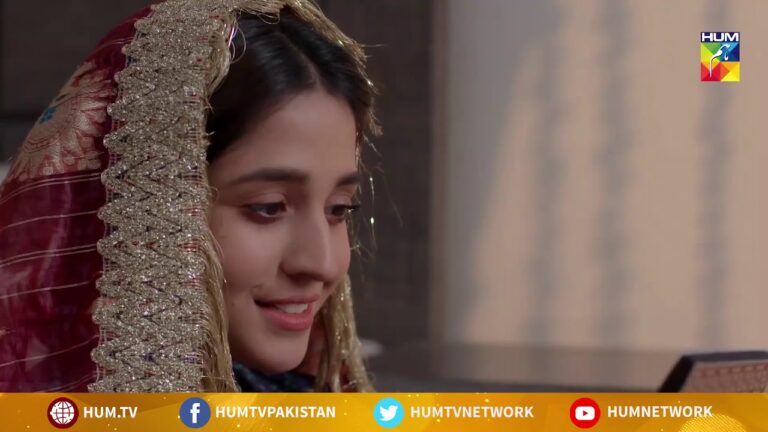Mere Ban Jao Drama Review: Hum TV’s drama “Mere Ban Jao” (2023) creates ripples for its depiction of a toxic relationship and the perils of social media. This review explores the drama’s plot, characters, and its social implications within Pakistani society, ultimately highlighting the importance of raising awareness about these dangers.
A Twisted Tale of Obsession and Control
The story centers around Azmiya (Kinza Hashmi), a young woman whose life spirals out of control after her engagement to Fardeen (Azfar Rehman). What begins as a seemingly loving relationship turns dark and poses dangers that are not immediately visible. Fardeen’s controlling and obsessive behavior manifests in insidious ways, including his manipulative attempts to isolate Azmiya from her friends and family.
The drama delves deeper into the dangers of social media when Fardeen coerces Azmiya into sharing private photos and videos. This leads to devastating consequences as he later threatens to leak them, blackmailing Azmiya into obedience. The narrative unflinchingly portrays the psychological and emotional turmoil Azmiya faces, trapped in this cycle of abuse and fear.
Characters Under the Microscope
Kinza Hashmi delivers a heartrending performance as Azmiya. She captures the character’s initial innocence, her slow descent into fear, and the conflicted emotions of a woman caught in a manipulative relationship. Azfar Rehman embodies the chillingly sinister Fardeen. His ability to switch from superficially charming to dangerously obsessive makes his character both captivating and deeply unsettling.
The supporting cast, including Zahid Ahmed as Azmiya’s childhood friend Zaki, add depth to the narrative. Zaki’s unwavering support and his attempts to help Azmiya serve as a crucial counterpoint to Fardeen’s toxicity.
Beyond the Screen: A Crucial Social Commentary
While undeniably captivating, “Mere Ban Jao” transcends mere entertainment value. It raises a mirror to the darker side of relationships and the pervasive risks of social media, especially for young women in conservative societies like Pakistan. Here are some key aspects of its social commentary:
- Normalizing Red Flags: The drama highlights the insidious ways in which toxic relationships can begin, masquerading as love and affection. Fardeen’s controlling behavior, often dismissed as possessiveness, serves as a cautionary tale about recognizing red flags early on.
- The Power of Manipulation: Fardeen’s manipulation tactics and gaslighting techniques exemplify the emotional abuse that can be an invisible yet devastating aspect of toxic relationships. The drama makes these tactics visible and offers a wake-up call to viewers.
- Dangers of Cyberbullying: The plotline involving leaked private photos and the subsequent blackmail is a stark reminder of the real-life dangers of cyberbullying and its devastating impact on victims, particularly women.
Sparking Conversations, Raising Awareness
“Mere Ban Jao” sparked vital conversations in Pakistan about domestic abuse, online safety, and the need for greater awareness about the psychological manipulation tactics used in toxic relationships. The drama’s unflinching portrayal of these issues is crucial for breaking societal taboos and empowering victims to speak out.
It also ignited a critical discussion about victim-blaming. The drama challenges the harmful notion of questioning Azmiya’s choices rather than condemning Fardeen’s actions. This stance is essential in shifting the narrative away from blame to accountability and perpetrator responsibility.
Criticism and Nuance
While the drama has been lauded for its social impact, some criticisms have also emerged. Certain viewers found the portrayal of violence unsettling. Others felt that the ending offered a somewhat idealistic resolution compared to the complexity of real-life abusive relationships.
It is important to acknowledge that “Mere Ban Jao” serves as a starting point for conversations, not a definitive guide to navigating these complex issues. Nuance is crucial for understanding how structural factors, societal expectations, and even personal trauma can play a role in the dynamics of abuse.
A Lasting Legacy “Mere Ban Jao” has cemented a critical space in Pakistani television for its willingness to address taboo topics. It serves as a reminder of the power of storytelling in raising awareness and sparking dialogue about challenging issues. The drama’s impact lies not just in its entertainment value but in its potential to inspire change. By encouraging viewers to recognize red flags, challenge victim-blaming, and promote online safety, it plants seeds of change, contributing to a society where women can live free from fear and control.
Beyond the Surface: Exploring the Layers of Mere Ban Jao
While the core review provides a comprehensive analysis of Mere Ban Jao’s narrative, characters, and social commentary, further exploration can offer deeper insights into the drama’s significance. Here are some aspects to delve deeper into:
1. The Psychological Impact of Abuse:
The review touches upon the emotional turmoil Azmiya experiences, but a deeper analysis can explore the broader psychological impact of abuse portrayed in the drama. This can involve:
- Examining the different forms of psychological abuse beyond physical violence, including gaslighting and emotional manipulation.
- Analyzing how the drama portrays the long-term effects of abuse on victims, such as low self-esteem, anxiety, and depression.
- Exploring the importance of seeking professional help and building a support system to overcome the trauma of abuse.
2. The Role of Family and Community:
While Zaki’s supportive role is mentioned, a deeper analysis can explore the broader role of family and community in addressing toxic relationships and online dangers. This can involve:
- Examining how societal pressures and the fear of social stigma can prevent victims from speaking out against abuse.
- Exploring the ways in which families and communities can support victims through open communication, empathy, and resources.
- Discussing the potential role of community awareness campaigns and educational efforts in preventing similar situations.
3. Exploring the Representation of Masculinity:
The portrayal of Fardeen as a manipulative abuser challenges traditional notions of masculinity. This can be further explored by:
- Analyzing how the drama breaks the stereotype of the “strong and protective” male by showcasing a character who uses his power to control and harm.
- Discussing the importance of promoting healthy and non-toxic representations of masculinity that emphasize respect, consent, and emotional intelligence.
- Exploring the potential impact of such portrayals on societal perceptions and expectations of men and their behavior.
4. Beyond the Pakistani Context:
While the drama is anchored in Pakistani society, its themes resonate on a global scale. Further exploration can reveal the broader relevance of the narrative:
- Examining how the universal themes of manipulation, emotional abuse, and online dangers resonate with audiences in different cultural contexts.
- Discussing the global significance of raising awareness about these issues and promoting healthy relationships and safe online practices.
- Exploring the potential for “Mere Ban Jao” to contribute to a broader international discourse on gender-based violence and online safety.
By delving deeper into these aspects, one can gain a richer understanding of “Mere Ban Jao” and its lasting impact beyond the realm of mere entertainment. The drama not only sparks conversations but also serves as a catalyst for change, encouraging individuals and communities to recognize red flags, promote healthy relationships, and create a safer online environment for all.










+ There are no comments
Add yours